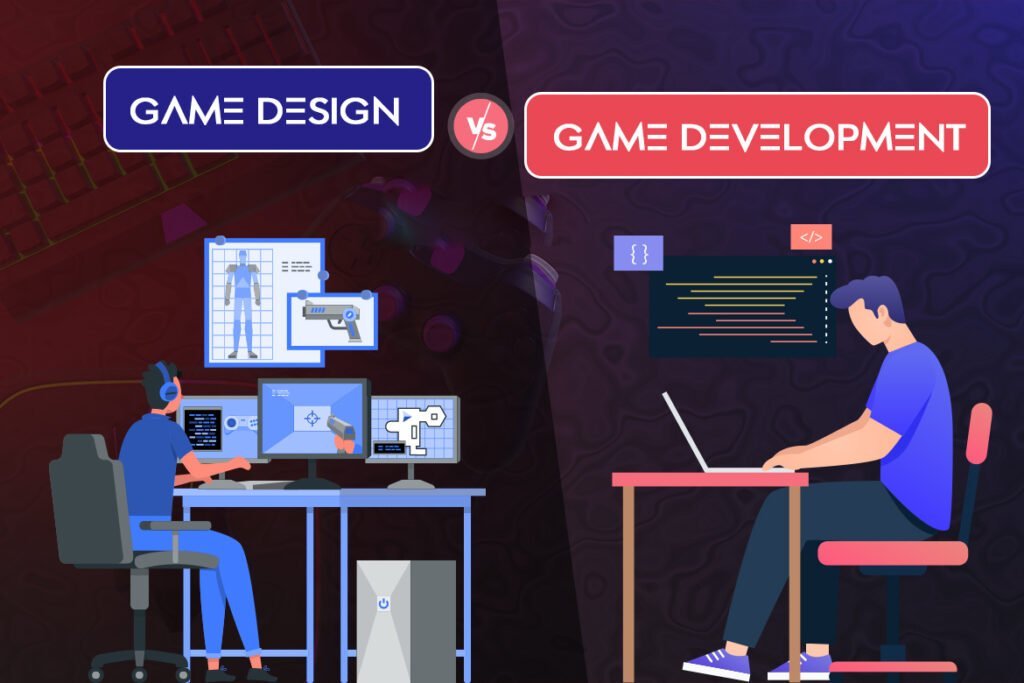Game design and game development UK are two critical components of the video game industry in the UK. While they are often used interchangeably, they refer to different aspects of video game creation. Game design primarily deals with the creative process of designing a game, including its concept, rules, gameplay mechanics, story, characters, and overall aesthetic.
On the other hand, game development UK involves the technical aspects of building a game, such as programming, testing, and debugging. Game design is an essential first step in creating a successful video game. It requires a deep understanding of player psychology, game mechanics, and storytelling.
Game designers typically work on conceptualizing and documenting a game idea, creating a framework for the development team to follow. They also design game levels, characters, and objects and decide how these elements interact. Game development UK is turning game design into a playable game. This involves programming the game engine, implementing game mechanics, creating 3D models and textures, and sound design.
Game developers work closely with game designers to ensure the final product meets the design vision while adhering to technical constraints and requirements. In summary, game design and development are two distinct but closely intertwined aspects of video game creation. While game design focuses on the creative aspects of the game, game development UK is concerned with turning those ideas into a playable game. Both are essential for creating a successful video game in the UK industry.
The Importance Of Understanding The Difference Between Game Design And Game Development
Understanding the difference between game design and development UK cannot be overstated. Game design is the creative process of conceptualizing, designing, and developing a video game’s rules, mechanics, and aesthetics. In contrast, game development UK is the technical process of implementing these concepts into a playable game. For those looking to create their video games, it is essential to understand both processes to ensure success.
Game design involves structuring gameplay elements such as objectives, levels, progression systems, goals, and rewards to engage players. Game designers must also consider how art assets can be used effectively to enhance the gaming experience. By setting out specific rules for each level or sequence and overall mechanics for the entire game, the designer creates an engaging experience for players.
Game development UK is the technical side of creating a video game. This includes programming all gameplay elements into code or other software languages so that they are interactable by players. It also involves ensuring that all graphics are adequately rendered on screen so they can be seen easily within the context of gameplay.

Additionally, game developers may need to optimize existing code or assets while remaining within established memory and performance constraints set by hardware platforms such as consoles or mobile devices. Ultimately, a deep understanding of game design and game development UK principles is critical for any aspiring video game creator wishing to make successful titles.
By mastering both disciplines in concert with one another, creators can better understand how every aspect of their games comes together cohesively from start to finish and deliver truly unforgettable experiences for players worldwide.
The Role Of Game Designers
Game Designers play a critical role in the development of video games. They are responsible for creating and maintaining the underlying structure of a game, from the overall story to individual levels, characters, and environments. They must think strategically about creating a compelling experience that keeps players engaged.
Game Designers use their creative vision and technical expertise to develop interactive experiences that are both entertaining and challenging. This requires them to understand user experience, game mechanics, art direction, scripting, and 3D modeling. A successful Game Designer must communicate effectively with artists, designers, programmers, and audio engineers to create a cohesive product.
Game Designers need strong problem-solving skills as they often face complex design challenges throughout the development cycle. They must stay up-to-date on technologies and trends to create innovative solutions.
As gaming technology continues to evolve, so too must the skill set of Game Designers. They must use imagination and logic when creating animations, play mechanics, level designs, artificial intelligence (AI) components, and other elements that make a game enjoyable for players while staying within budget constraints.
Influential Game Designer can also manage their time efficiently to meet tight deadlines set by publishers or investors. They must be comfortable working under pressure while still producing quality results throughout the entire process, from concept creation to launch day support.
Good communication skills are essential for managing expectations between team members and external stakeholders, such as marketing teams or investors, who may need help understanding all aspects of game development. Good Game Designers understand not just what makes an enjoyable video game but also what it takes for it to be successful commercially. They understand market trends and can anticipate potential challenges before they happen to help ensure the success of their projects.
The Role Of Game Developers
Game developers play a critical role in the development of successful video games. They are responsible for creating the game’s mechanics, art direction, narrative, and design elements. Game developers also collaborate with other team members to develop the game’s features and content.
Game developers must have an intimate knowledge of the game design process and be able to work efficiently with other people on their team to bring a quality product to market. They are responsible for creating a captivating game that appeals to gamers while meeting deadlines and budgets. They must be able to conceive original ideas and use creative problem-solving techniques when necessary.
The most important task of a game developer is coding, or “programming” – writing code that instructs the computer what it should do at each step of the game. This includes using programming languages such as C++, Java, or Python, defining algorithms, developing user interfaces (UI) and artwork, debugging any errors that arise throughout development, and polishing the gameplay until it is ready for release.
Additionally, many modern game developers are highly involved in the marketing process of their products, which entails social media outreach, website maintenance, and promotional events.

Another critical role for game developers is quality assurance (QA). This involves testing every aspect of a given video game—from its storytelling aspects to its most minute details—before its launch date. QA testers ensure that any glitches or bugs within a given video game are ironed out before it is released publicly; otherwise, it could lead to negative reviews from gamers and damage the reputation of the developer and publisher.
Ultimately, all game developers aim to create an entertaining experience that captures players’ imaginations while delivering top-notch gameplay experiences. While this may sound like a challenging task at times, it requires great skill & dedication by talented individuals within the industry who can bring something unique & engaging into every project they work on.
Distinction Between Game Design And Game Development In Terms Of Skills Required
Game Development UK requires specialized professionals versed in Game Design and Game Development UK. Game Design is focused on the creative side, including imagining the ideology behind a game, creating characters, establishing a world and storyline, developing mechanics, and designing levels.
Game Development UK is more about the technical side—using programming languages to create a functioning game with playable levels and characters that respond appropriately to user commands. Both skill sets require an understanding of digital graphics and animation principles and knowledge in software engineering, artificial intelligence techniques, mathematics, physics engine simulations, data mining/extensive data software systems, and more.
Game Designers must have excellent design sensibilities, while Game Developers must be team players who excel in their programming language. Ultimately Game Development UK relies on highly-skilled professionals who can think creatively and analytically to bring games to life.
Here are some critical points on the difference between game design and game development regarding the skills required.
- Game Design requires a creative mindset and the ability to design game mechanics that fit the desired genre or style of the game. In contrast, Game Development requires technical knowledge and programming skills.
- Game Design focuses on user experience and gameplay, which includes crafting engaging stories, characters, levels, puzzles, and challenges for players to overcome. On the other hand, Game Development UK involves coding and programming to create the game architecture and engine required for that particular game.
- Game Designers need to understand the player’s goals to ensure all aspects of the game are aligned with that purpose. During development, coders must understand algorithms, software engineering principles, and debuggers to write code for a specific platform or device.
- A Game Designer may also need soft skills such as communication, collaboration, and problem-solving to collaborate with artists and programmers on a project effectively. However, developers primarily use languages like Java or C++ to construct interactive game elements like menus, levels, or features.
- Game Designers must also have good organizational skills when developing designs for different game parts. At the same time, Developers will need excellent attention to detail to identify any bugs or errors that could occur during the testing stages.
- Both teams often need graphic designers, but their roles differ. In contrast, a Game Designer needs an eye for aesthetics to create visually appealing environments or interfaces, and a Developer requires graphic design skills to add impactful visuals to the gameplay.
- Game Designers must possess an understanding of psychology and be able to use research data from playtests to refine their designs according to their player’s reactions, whereas Developers must keep up with current technology trends so they can develop stable applications across multiple platforms quickly and efficiently.
Distinction Between Game Design And Game Development In Terms Of Process
Game Development UK is one of the leading ways to develop and design cutting-edge video games. Game design and development involve different processes but ultimately come together to create groundbreaking experiences for players.
The game design focuses on the creative elements of developing a game, such as the art style, character design, user interface design, level designs, and narrative structure.
Game development UK is more technical; it covers the programming language used in the game, hardware specifications, coding for different platforms such as PC or console gaming, debugging issues, and testing for stability.

While game design and development are necessary for creating a successful video game experience, Game Development UK offers a comprehensive platform where both processes work together directly to craft an unforgettable gaming experience.
Here are some critical points on the difference between game design and game development in terms of process.
- Game Design involves the creative process of conceptualizing, designing, and developing a game, while Game Development UK encompasses the programming, technical, and logistic aspects of creating a game.
- In terms of process, Game Design consists of creating game mechanics and level design and implementing sound effects and user interfaces. In contrast, Game Development UK requires coding and software engineering to create the executable product.
- Game Design is often concerned with storyboarding and narrative development, while Game Development focuses on programming languages such as C++ or Java and algorithms for computer graphics.
- During the design phase, developers must decide on a particular game engine that will be used to create the actual game; this usually falls under Game Development UK but can involve some creative input from the designer too.
- An important part of Game Design is balancing difficulty levels and rewards systems to ensure maximum player satisfaction. In terms of process, Game Development UK focuses on debugging code and optimizing performance.
- When developing a new game or significant update to an existing one, the designer typically kicks off by creating concept art or writing stories that involve characters and settings. The developer then implements these ideas into a working product by building upon architectural foundations such as user interface frameworks or physics engines.
- Testing is an integral part of both processes – testers can evaluate gameplay for bugs during the design phase before handing it over to developers for further refinement; once complete, testers step in again to ensure everything works correctly before launch day arrives.
- After completing development tasks related to coding, debugging, and optimization, developers are still responsible for packaging everything up into an executable file format that can be deployed onto various platforms such as consoles (PlayStation 4), PC (Steam), or mobile devices (iOS).
This final step is sometimes overlooked but is vital in ensuring users can access their desired gaming experience without any hitches.



